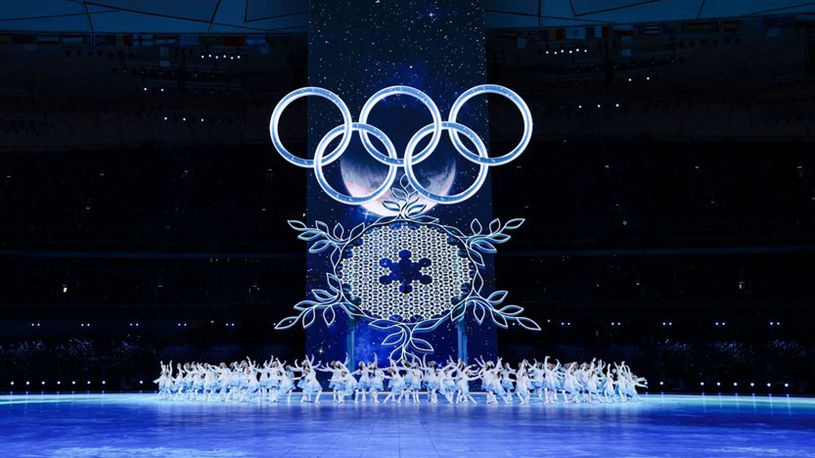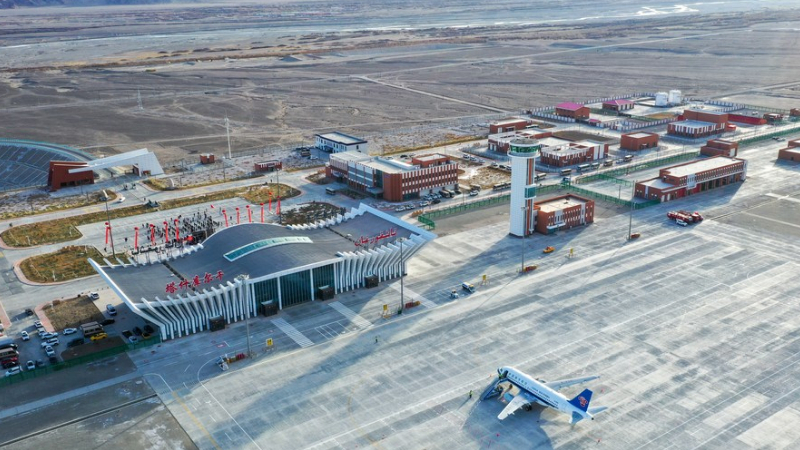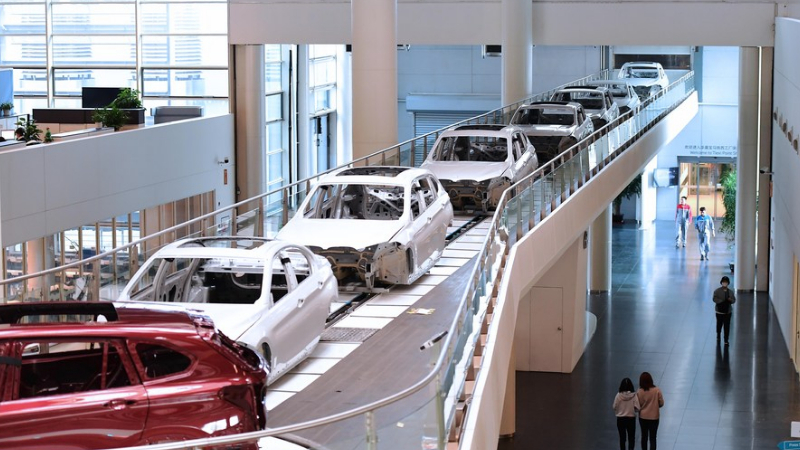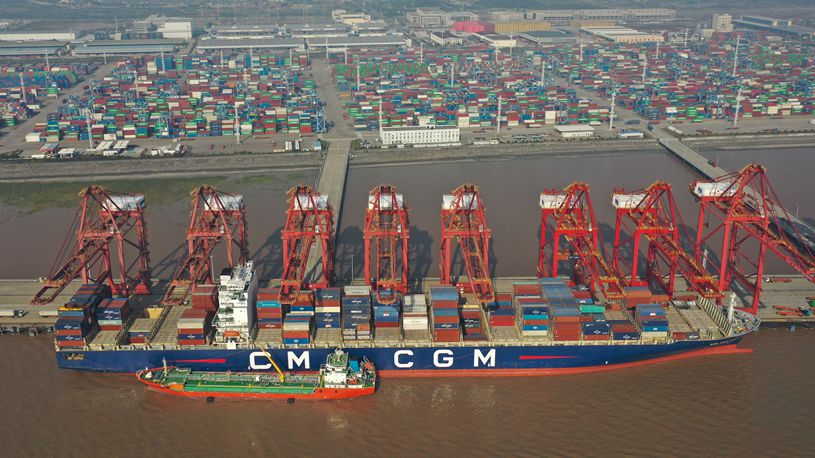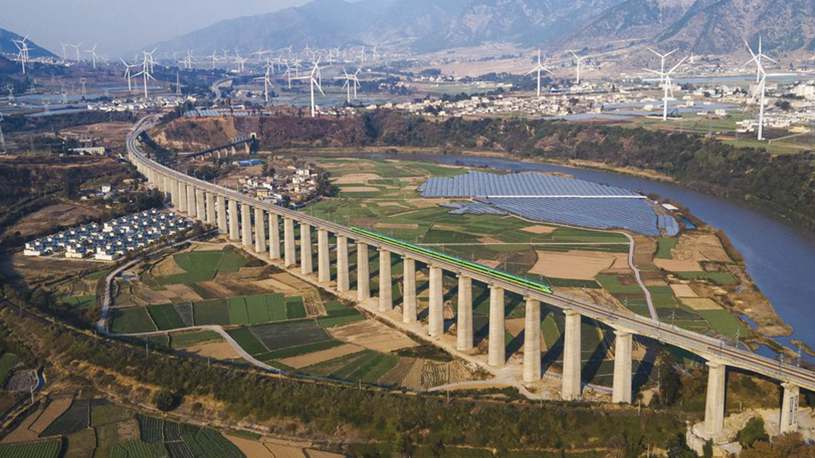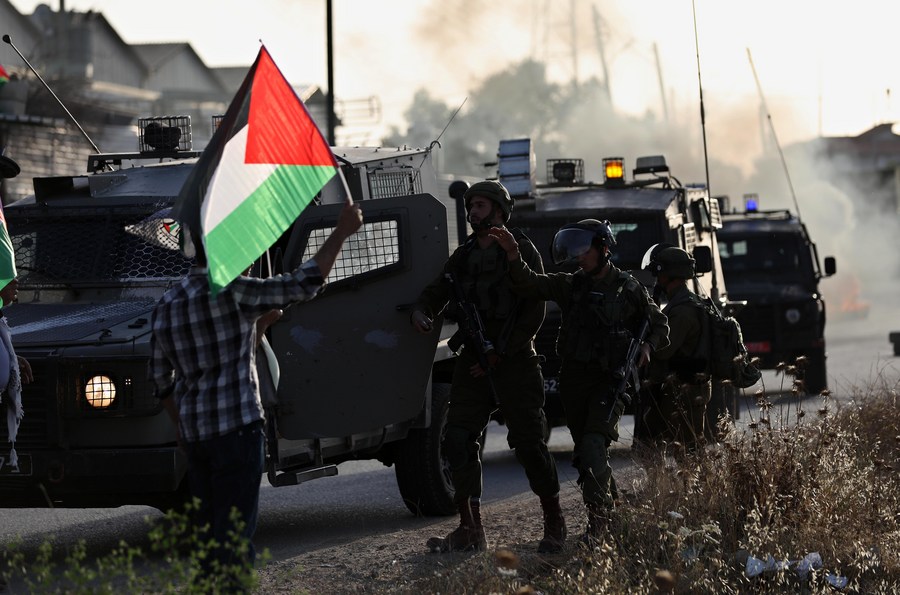
A man holds a Palestinian flag during clashes with Israeli soldiers and members of Israeli border police following a protest against the expansion of Jewish settlements in the village of Izbat at-Tabib near the West Bank city of Qalqilya, on May 31, 2022. (Photo by Ayman Nobani/Xinhua)
RAMALLAH/GAZA, Dec. 26 (Xinhua) -- For Palestinians, 2022 has been a challenging year marked by escalating Israeli crackdowns and the anti-Palestinian right-wing bloc's victory in Israel's parliamentary election, which have further dimmed the peace prospects.
Since the beginning of the year, the violence between Palestinians and Israeli security forces has intensified. In response to a string of fatal Palestinian attacks on Israelis, Israel launched the "Operation Breakwater" in March to crack down on Palestinian militants by carrying out frequent raids and arrests in the West Bank.
A total of 146 Palestinians were killed by Israel in the West Bank in 2022, the deadliest year since 2006, according to figures released in December by the UN Office for the Coordination of Humanitarian Affairs. In addition, 35 Palestinians were killed in the Gaza Strip.
The Palestinian Authority has so far reported 167 Palestinian deaths in the West Bank as result of Israeli attacks this year, while the Israeli military put the Palestinian death toll at 151, reported the Israeli media.
At the same time, 27 Israelis have died in Palestinian attacks, including 17 killed in five shooting and stabbing attacks in Israeli cities and 10 others killed in the West Bank. The death toll, the highest since 2008, included four Israeli soldiers and six settlers, according to the UN figures and media reports.
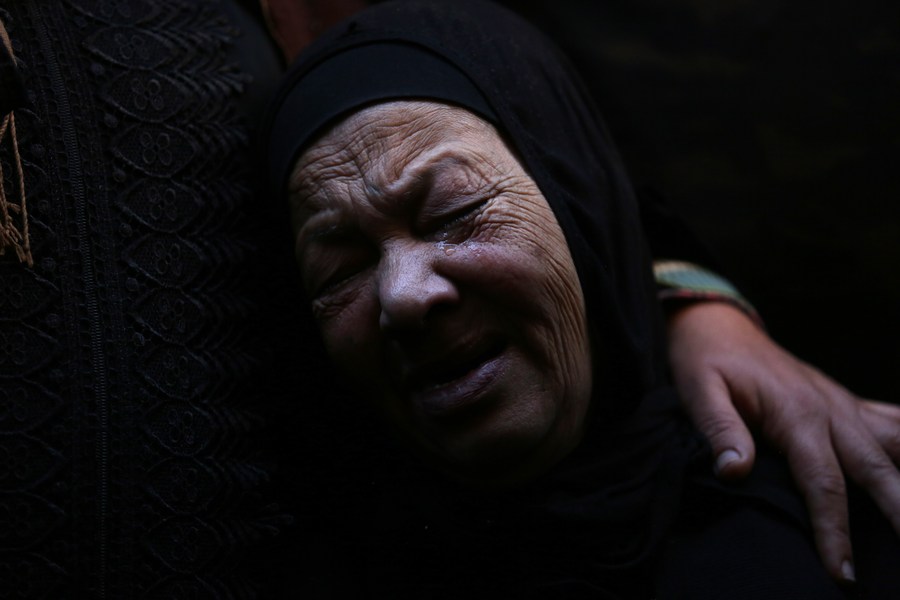
A relative of Palestinian Bakeer Hashash mourns during his funeral at Balata refugee camp in the West Bank city of Nablus, Jan. 6, 2022. The Palestinian Red Crescent Society said in a statement that Bakeer Hashash, a 21-year-old from Balata refugee camp in the suburb of the city, was critically injured by Israeli soldiers and died later in the hospital. (Photo by Nidal Eshtayeh/Xinhua)
ELUSIVE TWO-STATE SOLUTION
Witnessing the continued deterioration of the security and economic conditions in the West Bank intertwined with the escalating clashes with Israel, the Palestinians have become more convinced that peace will remain out of reach for the foreseeable future.
What made the matters worse for the Palestinians is the continued one-sided support to Israel by the United States, which largely ignores the Palestinian rights adopted by the international community.
In July, U.S. President Joe Biden made a short trip to the region, during which he spent about 40 hours in Israel but limited his stay in the West Bank city of Bethlehem to barely an hour.
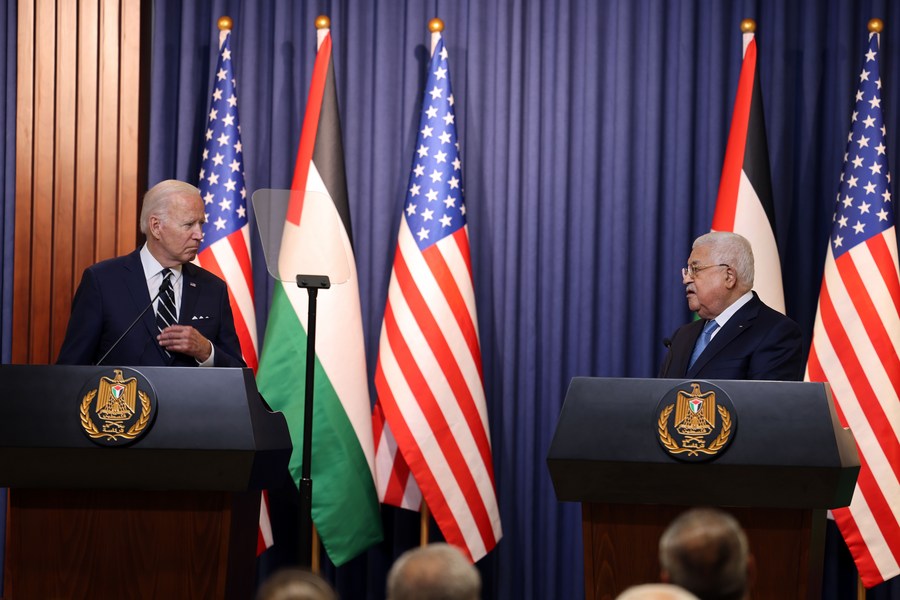
U.S. President Joe Biden (L) and Palestinian President Mahmoud Abbas attend a joint news conference in the West Bank city of Bethlehem, July 15, 2022. (Palestinian presidency/Handout via Xinhua)
During the stop, Biden admitted that "the goal of the two-state solution may seem unattainable." As if in compensation, he agreed to provide 200 million U.S. dollars to the UN Relief and Works Agency for Palestine Refugees (UNRWA) to support its critical role in the region.
"There is no doubt that the U.S. does not care about the political peace between the Palestinians and Israelis," Abdul Majid Sweilem, a Ramallah-based political analyst and writer for the al-Ayyam newspaper, told Xinhua.
Instead, Washington tries to push the Palestinians to abandon their long dream of establishing their own independent state, by providing meager economic aid to them, he said.
Sweilem added that successive U.S. administrations have been partial toward the Israeli-Palestinian issue in favor of Israel, by taking no real actions to push Israel to return to negotiation with the Palestinians.
The Israeli-Palestinian peace process has stalled since 2014 after rounds of negotiations sponsored by the U.S. failed to achieve tangible progress. Since then, Washington has taken no real actions to revive the process, while focusing on brokering new peace deals between Israel and Arab states to ease the international pressure on Israel.
SMALL PROGRESS IN RECONCILIATION
Moreover, the 15-year internal division between the Palestinian National Liberation Movement (Fatah) and the Islamic Resistance Movement (Hamas), which has ruled the Gaza Strip since 2007, continued to harm the Palestinian cause, analysts said.
"The escalation of Israeli practices requires intensifying Palestinian diplomatic actions toward forming the international public opinion," Hani al-Masri, director of the Ramallah-based Palestinian Center for Policy Research and Strategic Studies, told Xinhua.
Al-Masri stressed that the Palestinians have to unify the representation of the Palestine Liberation Organization (PLO) and "adopt all forms of resistance against the Israeli occupation."
Without returning to the national reconciliation process to unify all Palestinian organizations, the Palestinians will not gain any principal political goal in its struggle with Israel, he added.
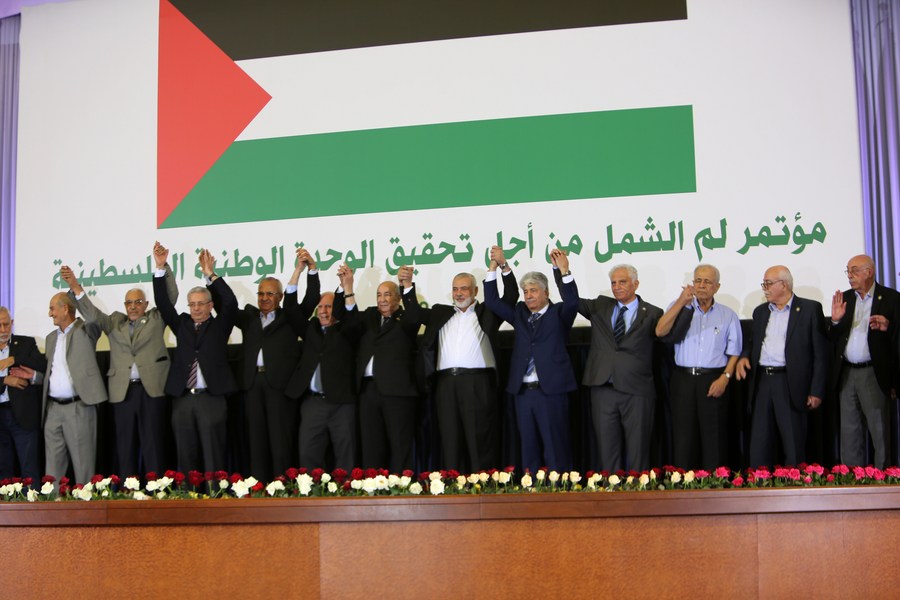
Algerian President Abdelmadjid Tebboune (7th R) and representatives of Palestinian factions pose for photos during a signing ceremony of Algiers Declaration in Algiers, Algeria, on Oct. 13, 2022. A total of 14 Palestinian factions on Thursday signed in Algiers a reconciliation deal that aims to end their 15-year-long division, state-run ENTV reported. The deal, formally known as Algiers Declaration, was signed by representatives of 14 Palestinian factions, including the Fatah party and Hamas, during a ceremony in the presence of Algerian President Abdelmadjid Tebboune. (Xinhua)
Small progress was achieved on the reconciliation issue in 2022 thanks to the mediating efforts made by Algeria. In October, 14 Palestinian factions, including Fatah and Hamas, signed the Algeria Declaration of National Reconciliation, agreeing to hold legislative and presidential elections within a year.
Still, doubts remain whether the Palestinian factions will achieve genuine reconciliation.
"However, all the reconciliation efforts will fail," Mukhaimer Abu Saada, a Gaza-based political expert and lecturer at the al-Azhar university, told Xinhua, citing that Fatah and Hamas failed to catch the opportunities to unify during Israel's four large-scale wars against Gaza in 2008, 2012, 2014 and 2021.
SLIMMER PROSPECTS
Saada argued that the Algeria Declaration was "incomplete" and did not deal with all the issues of the internal Palestinian divisions, such as rebuilding the PLO and forming a national unity government.
Following the Israeli "military escalation" under the administration of outgoing Prime Minister Yair Lapid, the situation is expected to deteriorate even further in 2023, he added.
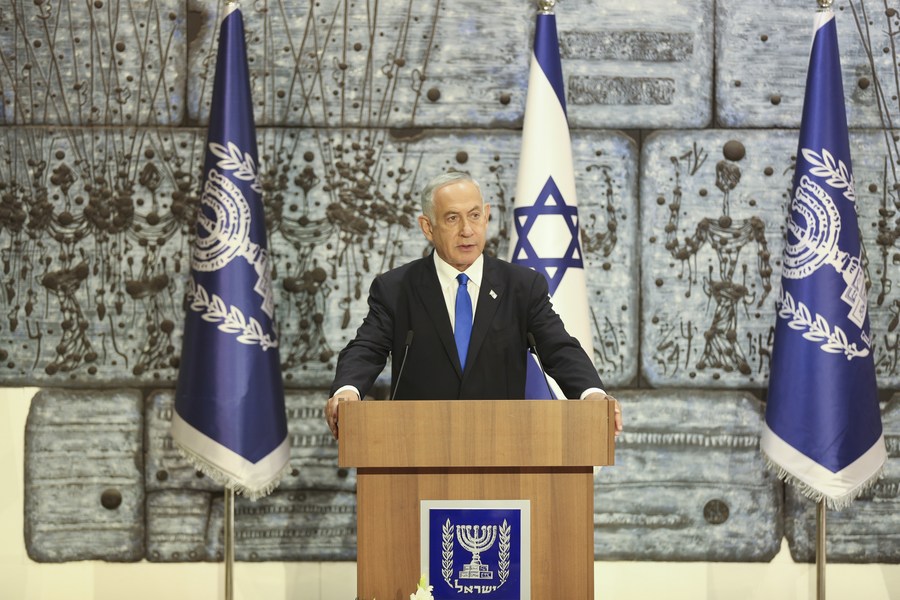
Former Israeli Prime Minister and leader of the Likud party Benjamin Netanyahu speaks before receiving the mandate from Israeli President Isaac Herzog to form a new government at the President's Residence in Jerusalem, on Nov. 13, 2022. Israeli President Isaac Herzog on Sunday tasked former Prime Minister Benjamin Netanyahu with forming a new government, after the victory of the veteran politician and his alliance of far-right parties in parliamentary elections. (Xinhua/Wang Zhuolun)
On Nov. 1, Israel's former Prime Minister Benjamin Netanyahu and his extreme right-wing bloc won the Israeli parliamentary election by garnering 64 out of the 120 seats in parliament.
Sweilem said that the upcoming political landscape in Israel "will be darker and more difficult" for the Palestinians as the peace process will be harder to produce any breakthrough under the extreme right-wing Israeli government led by Netanyahu.
Ahmad Rafiq Awwad, a political science professor at the Al-Quds University, told Xinhua that Israel will form an "extremist right-wing government that does not believe in peace with Palestinians."
He expressed worries about the inclusion of ultranationalist leaders in the new Israeli government, including Itamar Ben-Gvir, head of the anti-Palestinian Jewish Power party, and Bezalel Smotrich, leader of the Religious Zionism party which advocates for settlement expansion and annexation of the West Bank.
"Both Ben-Gvir and Smotrich will contribute to escalating the situation in the West Bank as they will use their radical ideologies in dealing with Palestinians," Awwad warned. ■

